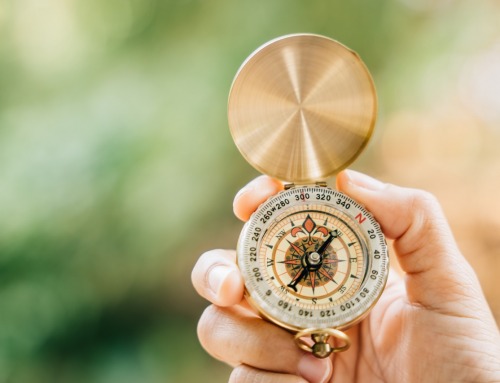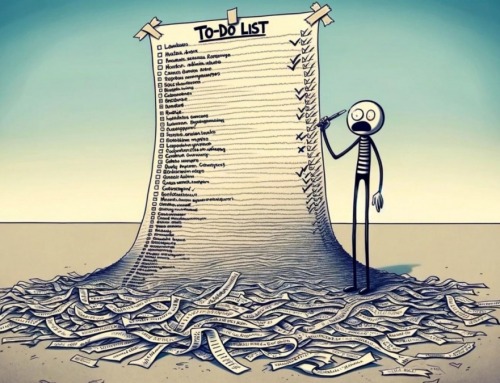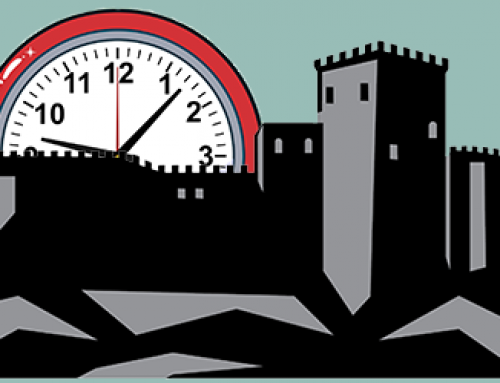Time management is a lie we need to stop telling ourselves
Time management is an illusion. It’s not real. Out of all the things we can manage in our life, time isn’t one of them.
By definition, when we manage something we have control of it, we govern it, we can train it, influence it. You’ve probably already noticed, we can’t start time or stop it, can’t slow it down or speed it up. We can’t store it, manufacture it, or trade it.
We can’t manage time.
No, you can’t manage time
Deep inside we know we don’t manage time. We tell ourselves that we do, because it holds us less responsible for what we don’t get done—we blame time and not ourselves.
Calling it time management is like a ship captain saying he’s doing wind management, or ocean current management, or tide management—instead of saying that he’s responsible for moving his craft to a destination by a deadline—regardless of the wind, or the currents, or the tide. He can only respond to their effects—hopefully to his advantage.
What you do today is important because you are exchanging a day of your life for it.
So, what can we manage if we can’t manage our time?
We can manage our own behavior, our dreams and desires, our choices, decisions, priorities, our energy, our focus, our relationships, how we handle distractions… all those things exist within us. We can control and manage them.
But manage time? We need to stop telling ourselves that lie. We don’t need to focus on our time, we need to focus on our tasks, our appointments, our desires, our commitments, our distractions, our energy, our efforts.
Here is the truth of what is within your control:
How many times you smile today.
How much effort you exert at work.
Your level of honesty.
How well you prepare.
How you act on your feelings.
How often you say “thank you.”
When you pull out your wallet for luxuries.
Whether or not you give someone the benefit of the doubt.
How you interpret situations.
Whether or not you compete with people around you.
How often you notice and appreciate small acts of kindness.
Whether you listen or wait to talk.
When you walk away from a conversation.
How nice you are to yourself in your head.
Whether you think positive or negative thoughts.
Whether or not you form expectations of people.
The type of food you eat.
When you answer someone’s question—or email or call.
How much time you spend worrying.
How many new things you try.
How much exercise you get.
How many times you swear in traffic.
Whether or not you plan for the weather.
How much time you spend trying to convince people you’re right.
How often you think about your past.
How many negative articles you read.The attention you give to your loved ones when you see them.
How much you enjoy the things you have right now.
Whether or not you communicate something that’s on your mind.
How clean or uncluttered you keep your space.
What books you read.
How well you network at social events.
How deeply you breathe when you experience stress.
How many times you admit you don’t know something—and then learn something new.
How often you use your influence to help people instead of focusing on building your influence.
When you ask for help.
Which commitments you keep and cancel.
How many risks you take.
How creative/innovative you are in your thinking.
How clear you are when you explain your thoughts.
Whether you formulate a new plan or act on your existing one.
How much information you get before you make a decision.
How much information you share with people.
Whether you smoke or drink.
Whether or not you judge other people.
Whether you smell good or bad.
How much of what other people say you believe.
How quickly you try again after you fall.
How much rest you get at night.
Is your future within your control?
Can you, with certainty, predict your future?
Maybe not the distant future—not five or ten years from now—something a lot closer.
How about two weeks? That’s 14 days or 336 hours from now.
Can you predict how things will be better in your life two weeks from now?
There’s actually a pretty reliable way to predict the future: Instead of guessing what will happen, go out and make those things happen. The most reliable way to predict the future is to create it.
In order to have the best possible transformational experience over the next two weeks, we want you to test-drive your own fully functional planner.
That’s exactly why we offer a free 14-day trial of our PlanPlus Online planner-organizer!
Here are some suggestions as to how you can use your trial time:
Subdue and conquer your task list!
Be the master of your calendar—not a slave!
Do a positive makeover in your life!
Translate your dreams into reality with weekly planning to schedule your life’s priorities!
Daily notes and journal.
Don’t go another day disorganized!
Start your free 14-day trial of our PlanPlus Online planner-organizer today!






